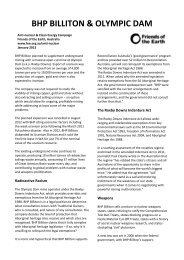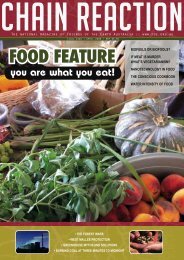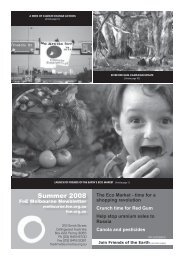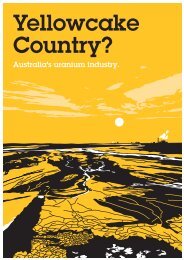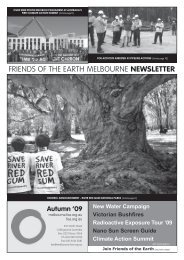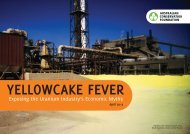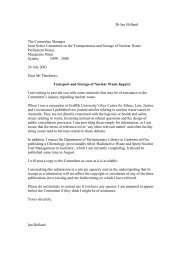Thirty Years of Creative Resistance - Friends of the Earth Australia
Thirty Years of Creative Resistance - Friends of the Earth Australia
Thirty Years of Creative Resistance - Friends of the Earth Australia
Create successful ePaper yourself
Turn your PDF publications into a flip-book with our unique Google optimized e-Paper software.
as a tactic amongst o<strong>the</strong>rs, <strong>the</strong>re were<br />
also philosophical underpinnings to this<br />
approach. The idea <strong>of</strong> ‘green’ or ‘natural’<br />
capitalism gained considerable favour<br />
amongst some key individuals in <strong>the</strong><br />
<strong>Australia</strong>n environment movement and<br />
this helped create a political climate that<br />
encouraged collaboration ra<strong>the</strong>r than<br />
conflict with big business.<br />
Reflecting growing links with a cross<br />
section <strong>of</strong> progressive unions and o<strong>the</strong>r<br />
social organisations, FoE joined with <strong>the</strong><br />
Electrical Trades Union, <strong>the</strong> <strong>Australia</strong>n<br />
Nursing Federation and o<strong>the</strong>rs in 1998<br />
to launch <strong>the</strong> <strong>Earth</strong>worker alliance. It<br />
aimed to be a ‘non factional and non<br />
interventionist’ forum to ‘allow for greater<br />
co-operation between green groups<br />
and trade unions.’ Despite building<br />
considerable momentum in its first few<br />
years, a serious conflict over forest issues<br />
following a forest workers union counter<br />
blockade <strong>of</strong> a green protest camp in <strong>the</strong><br />
Otway Ranges in 2000 caused a dramatic<br />
loss <strong>of</strong> momentum from which <strong>Earth</strong>worker<br />
is yet to recover. The <strong>Earth</strong>worker project<br />
remains indicative <strong>of</strong> <strong>the</strong> types <strong>of</strong> initiatives<br />
and style <strong>of</strong> operation <strong>of</strong> FoE.<br />
In ano<strong>the</strong>r, FoE Brisbane was pivotal in <strong>the</strong><br />
creation <strong>of</strong> <strong>the</strong> highly successful Brisbane<br />
Social Forums, which are modelled on <strong>the</strong><br />
World Social Forums held each year.<br />
In 2000, FoEA established its climate<br />
justice campaign. Since <strong>the</strong>n it has played<br />
a significant role in highlighting <strong>the</strong> human<br />
dimensions <strong>of</strong> climate change. A key part<br />
<strong>of</strong> this work has been to include <strong>the</strong> equity<br />
aspects <strong>of</strong> <strong>the</strong> climate debate, highlighting<br />
<strong>the</strong> fact that poorer communities will bear<br />
a disproportionate burden <strong>of</strong> <strong>the</strong> social and<br />
economic costs <strong>of</strong> global warming.<br />
In April 2001, FoE hosted an international<br />
seminar on <strong>the</strong> <strong>the</strong>mes <strong>of</strong> climate justice<br />
and globalisation. The seminar featured<br />
Ricardo Navarro, <strong>the</strong> chairperson <strong>of</strong> FoE<br />
International, Patrina Dumaru <strong>of</strong> <strong>the</strong><br />
Pacific Concerns Resource Centre in<br />
Fiji, and Nnimmo Bassey <strong>the</strong> director <strong>of</strong><br />
Environmental Rights Action/ FoE Nigeria.<br />
At this time, with a strong climate justice<br />
...................................................................................................................................................................................................<br />
Ricardo Navarro <strong>of</strong> FoE El Salvador. <strong>the</strong> chair <strong>of</strong><br />
FoE International.<br />
collective and Alan Hoban working<br />
as <strong>the</strong> FoE campaigner on this<br />
issue, a series <strong>of</strong> street events,<br />
public meetings and direct actions<br />
were held to highlight <strong>the</strong> human<br />
dimensions <strong>of</strong> climate change. FoE<br />
started combining <strong>the</strong> concepts <strong>of</strong><br />
ecological debt into its work and<br />
began advocating for recognition <strong>of</strong><br />
environmental (climate) refugees.<br />
From 2000 onwards, FoE devoted<br />
even more attention to <strong>the</strong><br />
ecological and social impacts <strong>of</strong><br />
<strong>the</strong> establishment <strong>of</strong> plantations,<br />
including use <strong>of</strong> herbicides,<br />
impacts on ground water and o<strong>the</strong>r<br />
negative elements <strong>of</strong> this land use.<br />
For instance, in Western Victoria,<br />
FoE highlighted <strong>the</strong> fact that<br />
habitat <strong>of</strong> <strong>the</strong> critically endangered<br />
Red Tail Black Cockatoo was<br />
being destroyed by a company<br />
that was establishing plantations.<br />
FoE 30 <strong>Years</strong> 53



